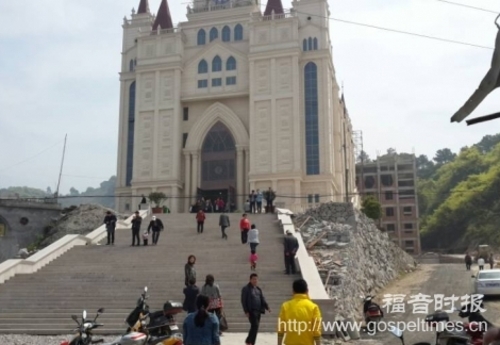
On the face of it, it seemed like a classic case of an oppressive atheistic regime going after an innocent group of Christians. However, as the story unfolded and continued to be reported in the Chinese press (both Christian and secular), it became clear that it was much more complicated than that.
Some of the things we have learned from Chinese-language media:
- As a legally registered TSPM church, Sanjiang Church had received permission to build its sanctuary
- There was some dispute with local officials about the size of the cross on top of the building. It's not clear whether this had to do with building code regulations or a desire on the part of officials to limit the visible expression of the church in the community
- Having received permission to build a 1,800 square meter facility, the church decided to "seize the opportunity" and started building a seven-story annex, bringing the total building area to 12,000 square meters (this according to a church official). This was done even though requests for permission had been refused several times.
- In 2013 Zhejiang Province launched a campaign to destroy old buildings and illegally built structures, ostensibly as a way of improving urban public safety.
- Wenzhou officials cited the church's annex (which is still under construction) as illegal and came to tear it down.
- Officials threatened to take the whole sanctuary down unless the annex and the cross were removed (again, it is unclear why the cross was such an issue).
- At last report, church and local officials had reached an agreement that allows the church to keep both the building and the cross. However they are required to deal with the annex "in accordance with the law." The church has begun removing the top two floors of the annex.
This incident highlights the ongoing tension between church leaders (even TSPM) and local officials, particularly when it comes to land use a hot topic in cities across China, where local officials' ability to control the distribution of land is a key factor in providing revenue for the city (not to mention for themselves). Thus it is usually difficult for churches to get permission to build new buildings or to expand existing facilities.
Wenzhou is particularly problematic, given the relative freedom believers there have enjoyed to put up church buildings (whether registered or unregistered), not a few of which are mammoth cathedral-style structures. On the one hand, the proliferation of churches is obvious; on the other, officials have to maintain some semblance of being in control of the situation and feel compelled once in a while to clamp down. This seems to be the case here.
This incident also provides an example of the new challenge that the church faces as it becomes more mainstream; namely, how to participate with the government in building up the community. It is no longer enough just to "get away with" putting up a church (with or without permission), nor is there much value in doing so as a political statement. One may argue that continuing in this vein just exacerbates tensions with officials and reinforces the idea that the Christians are antisocial and can't be trusted.
In this case the government, likely for good reason, had a policy of cleaning up the city. Allowing another illegal structure to be built when they were attempting to get rid of existing illegal structures wouldn't make much sense, so it is understandable that they felt compelled to take action. As a legally registered church, the church should have made clear its intentions to the government beforehand and gotten the necessary permissions to build.
On the other hand, nothing is this straightforward in China. Evidently the church's previous attempts to get permission to build a large building for housing clergy and other purposes had been thwarted repeatedly. We do not know what axes the officials had to grind, particularly whether the issue of the cross was in fact the main reason for their going after the church in the first place. If there are height restrictions that would affect the cross then the church needs to abide by these or negotiate an exception. If the officials were just looking for an excuse to clamp down on the church then the believers would have a case (except for the fact that they were in the process of building an illegal structure).
Local officials are expected to carry out their responsibilities in such a way as to preserve social order. In this case that did not happen, so it is quite possible that the central government authorities were not pleased with the way they handled the matter and stepped in to urge them to solve the matter "harmoniously."
The ChinaSource Team
For Prayer:
- Pray that the agreement reached regarding the Sanjiang Church will be fully implemented and respected by both parties.
- Pray that local officials will not use the campaign as an excuse to harass and hinder churches.
- Pray that local believers will use this opportunity to demonstrate to local officials that they are not "bad elements" in society.
- Pray that observers in the West will grow in understanding of the complex relationships between the church in China and the Chinese government.
Photo Credit: Gospel Times
Are you enjoying a cup of good coffee or fragrant tea while reading the latest ChinaSource post? Consider donating the cost of that “cuppa” to support our content so we can continue to serve you with the latest on Christianity in China.
